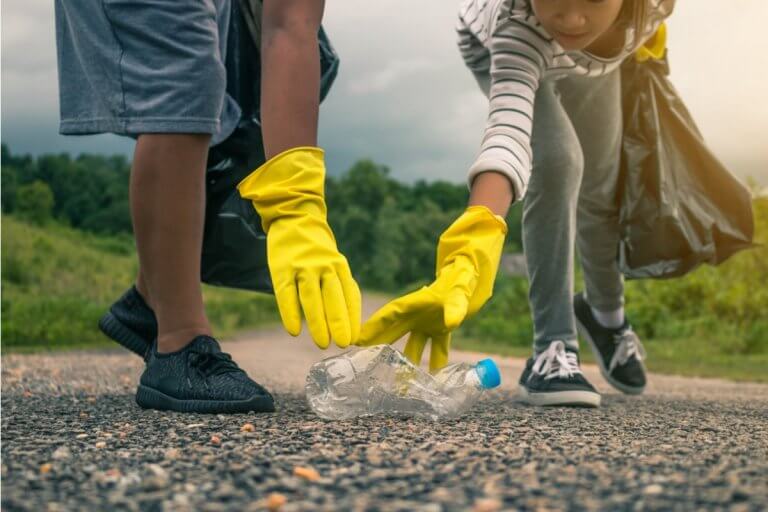
Living sustainably isn’t just a trend – it’s a lifestyle.
While some students are skipping school and striking for climate change action, what can you do to reduce your carbon footprint?
If you’re serious about reducing your environmental impact and making changes to your lifestyle to make the world a better place, here are some suggestions on how you can get started:
Stop using plastic straws
No body thinks getting rid of plastic straws a global solution, but small steps matter. Cleaning up the Earth won’t have 1 big fix-all cure, it’ll be a combination of a lot of big and small initiatives. https://t.co/gX7NGhyJjV
— SmallAssEyes (@HalfOfABurrito) March 20, 2019
Plastic straws can’t be recycled and often find their way into our oceans where they hurt marine life.
So, whenever possible, try to avoid them – instead, drink straight from a cup, glass or can. If you must, carry some metal straws with you when heading out. They’re small and slim enough to slip into your backpack or purse without taking up too much space.
Opt for green feminine supplies
More and more women have been turning to menstrual cups for a more economical and environmentally-friendly solution over traditional hygiene products. #OBGYN #MtAuburn
https://t.co/GtYzbIDBp2 pic.twitter.com/blWOINvLoL— Mt. Auburn OBGYN (@MtAuburnOBGYN) March 20, 2019
This is for all the women out there – did you know that your monthly period can negatively impact the environment, depending on the product you use?
One study found that on average, women use between 11 and 30 tampons per cycle, while Slate reported that “the average woman throws away 250 to 300 pounds of ‘pads, plugs, and applicators’ in her lifetime”, which is a lot of waste.
We know that feminine care products are a personal choice, but by making small changes to your lifestyle, such as opting for reusable cotton pads instead of disposable ones, or switching to tampons without plastic applicators or even using menstrual cups, you’ll be doing the world a huge favour by reducing waste sent to our landfills.
Use a bamboo toothbrush
Bamboo toothbrushes are naturally antimicrobial, eco-friendly and biodegradable.
While a plastic toothbrush will sit in a landfill for a long time and release toxic chemicals as it decays, a bamboo toothbrush will naturally decompose after it’s been dis… https://t.co/KCpyAU74YI pic.twitter.com/2Q3rtebQ5Z— EcoRoots (@EcoRoots3) March 18, 2019
Toothbrushes are made from plastic, and bamboo toothbrushes are said to be a better alternative as they are biodegradable.
However, before you make your purchase, you may want check what the bristles are made from. Some are made from non-biodegradable material, while others are made with animal hair – most commonly, pigs, which may not be suitable for Muslims or vegans.
Need clothes? Buy pre-loved
Sarah Fewell started buying and selling second-hand clothes during her second year @GoldsmithsPolit, now her online business Identity Party is part of a growing movement against fast fashion. Read more of her story in The Guardian https://t.co/QkTADFm3kf
— Goldsmiths (@GoldsmithsUoL) March 2, 2019
Fast fashion is ruining the planet. So, instead of buying new clothes, why not resist and only purchase new items when you really need them, or consider shopping at second-hand stores for clothes?
The average lifetime for a garment is a mere 2.2 years in the UK. Speaking to The Guardian, Traid Chief Executive Maria Chenoweth said “Each week we (in the UK) buy 38 million items and 11 million items go to landfill.”
Food for thought.
Avoid products with microbeads
In Win for the Earth, Microbeads Will Be Banned in the UK By 2017 https://t.co/Ij1pnOqpBq #globalcitizen
— Michele Greene (@Michele72086840) March 20, 2019
Microbeads are tiny plastic beads found in many personal care products, such as face and body scrubs. Despite thoughts that they keep our face and skin feeling ultra smooth and healthy, they are, in fact, bad for our health and the environment.
Microbeads are small enough to pass through filtration systems, which means they end up in our water supply and are eaten by marine life, thus putting our health us at risk when we eat fish contaminated by microbeads.
Instead of purchasing face or body scrubs with microbeads, you’re better off making your own – it’s as simple as using coarse sugar (white or brown) and some oil (e.g. coconut, olive oil) and rubbing it gently on your skin.
Encourage family and friends to make small changes to their lifestyles
Going to work this morning, saw many kids with their fab handmade signs, walking with parents or carers to march #YouthStrike4Climate . Really proud of the new generation’s engagement with their environment. @GretaThunberg #oxford #NoPlanetB #ClimateChange
— Valeria Crowder (@ValeriaCrowder) February 15, 2019
If you’re an environmentally-conscious person, you could do your bit to encourage others within your social circle to lead a more sustainable lifestyle.
But if that sounds like a tough nut to crack, don’t fret. Do they have a birthday coming up? Why not gift them with a set of eco-friendly products, such as bamboo toothbrushes, eco-friendly bags, a homemade body scrub or even metal or glass straws to help them start out?
Greta Thunberg, 16, managed to convince her parents to be more environmentally-friendly, and we could all take a cue from her.
Think about how your eco-friendly products came to fruition
Bought a bamboo toothbrush then realized it was wrapped in plastic.. So close yet so far
Ft. Luna pic.twitter.com/QKrtXPO0p7— Trash (@TashReesEvans) March 21, 2019
Despite what was explained above, being sustainable isn’t merely about buying eco-friendly products like bamboo toothbrushes or clothes from eco-friendly brands. It also involves thinking about where your products came from and how they got to your local store and into your hands.
For example, you may think you’re doing the world a favour by ordering bamboo toothbrushes from an e-commerce store, but does that product ship from abroad? Was it partially made from animals, and were they harmed in the process? Did the process of making the product involve burning more fossil fuels?
We know that it can be near impossible to only use products that produce (or were made with) no carbon emissions. Instead, think about how you can balance the environmental damage you make from your choices and decide accordingly. Remember: small changes matter in the long run.
Liked this? Then you’ll love…
How to promote a sustainable mindset within your school community
Be part of the sustainable future with a degree in environmental science







